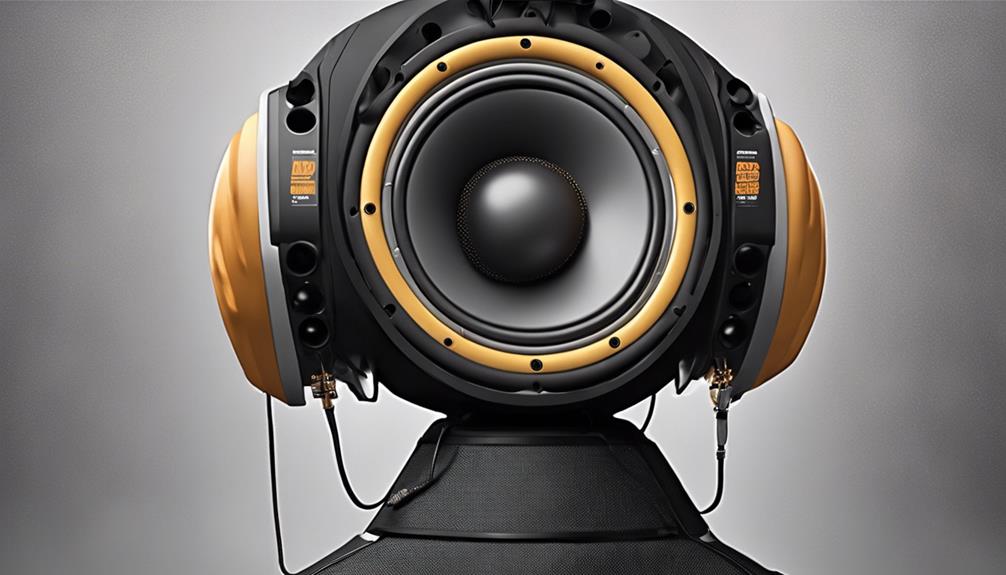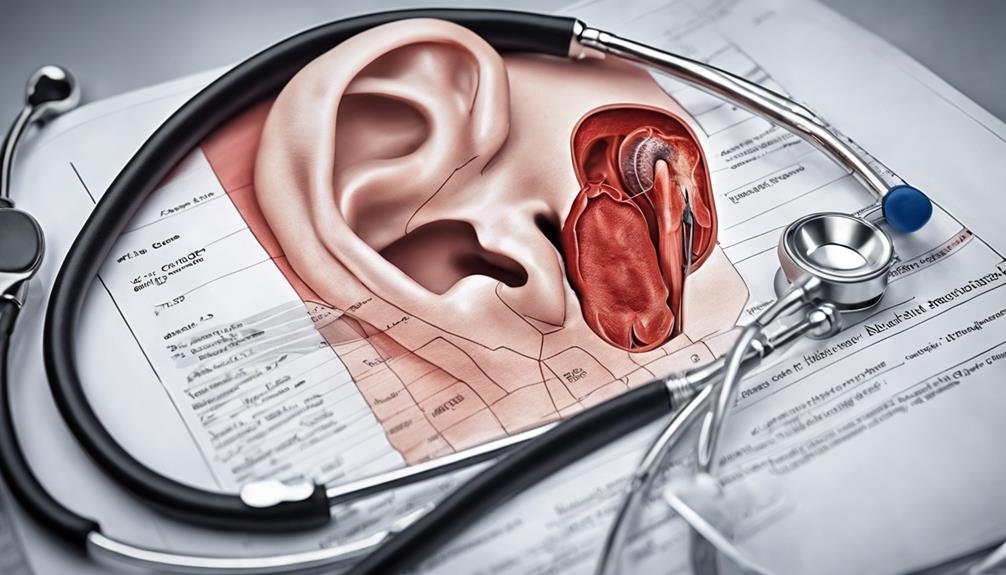Exploring the intricate connection between hearing loss and headaches is like untangling a twisted thread, uncovering unexpected connections. The correlation between these seemingly unrelated issues indicates a complex interplay that deserves further exploration.
As we delve into the depths of this relationship, we unearth compelling insights that shed light on the potential impact of hearing loss on headaches. Join us on this journey as we uncover the nuanced mechanisms and implications that underlie how hearing loss can trigger headaches, offering a comprehensive guide to navigating this intricate terrain.
Key Takeaways
- Hearing loss can lead to changes in blood flow, inner ear disruptions, cognitive overload, and emotional stress, all contributing to headaches.
- Stress, tension, and cognitive effort from untreated hearing loss can exacerbate headaches.
- Treatment options like addressing root causes, using hearing aids, and regular ear care can reduce hearing loss-related headaches.
- Migraine sufferers face increased risks, emphasizing the importance of regular hearing tests and personalized solutions for headache prevention.
Mechanisms of Hearing Loss-Related Headaches
Hearing loss-related headaches stem from a complex interplay of physiological and psychological factors. Changes in blood flow, especially in the brain, due to hearing loss can trigger headaches. The inner ear plays a crucial role in this process, as hair cells within the cochlea convert sound vibrations into electrical signals that travel along auditory pathways to the brain. When hearing loss occurs, this intricate system is disrupted, leading to increased strain on the brain to process sounds. This can result in cognitive overload, contributing to headaches and migraines.
Moreover, the effort required to concentrate and understand speech with hearing loss can also lead to discomfort and tension headaches. The emotional impact of hearing loss, including stress, frustration, anxiety, and depression, further exacerbates the situation. These psychological factors play a significant role in the development of headaches related to hearing loss. By understanding the mechanisms behind these headaches, individuals with hearing loss can better manage their symptoms and seek appropriate support and treatment.
Impact of Hearing Loss on Headaches

The intricate relationship between hearing loss and headaches becomes more pronounced when considering the impact of untreated hearing impairment on an individual's overall well-being. Untreated hearing loss can lead to various issues such as stress, tension, increased cognitive effort, and social isolation, all of which can contribute to the development and exacerbation of headaches.
| Impact of Hearing Loss on Headaches | |
|---|---|
| Factors | Impact |
| Stress | Triggers headaches |
| Tension | Contributes to headache development |
| Cognitive Effort | Increases likelihood of headaches |
| Social Isolation | Emotional impact leading to chronic headaches |
The stress and tension stemming from difficulties in communication, the cognitive effort required to compensate for hearing loss, and the emotional toll of social isolation can all manifest as headaches. Understanding these impacts is crucial in addressing the holistic well-being of individuals with hearing loss and in developing appropriate interventions to alleviate both the auditory and headache-related symptoms.
Treatment Options for Hearing Loss Headaches

Addressing headaches associated with hearing loss involves exploring various treatment options that target both the underlying causes of the hearing impairment and the headaches themselves.
When considering treatments for headaches related to hearing loss, it's crucial to address the root causes such as ear infections, exposure to loud noise, and conditions like tinnitus. Treating underlying issues like ear infections through medication or surgical procedures can't only improve hearing but also alleviate associated headaches.
Additionally, using hearing aids or cochlear implants can enhance hearing abilities, potentially reducing the frequency and intensity of headaches. Regular ear cleaning to prevent wax buildup is also essential in managing headaches linked to hearing loss.
Seeking professional help for hearing loss is paramount, as it can lead to personalized treatment plans that target both the hearing impairment and the headaches, providing comprehensive relief. By addressing the cause of hearing loss, individuals can effectively manage and potentially diminish the headaches associated with it.
Connection Between Migraines and Hearing Loss

Exploring the intricate relationship between migraines and hearing loss reveals compelling insights into the potential impact of migraines on auditory function.
Individuals with migraines face an increased risk of experiencing tinnitus and hearing loss, with studies indicating a significant link between these conditions. Researchers found that changes in blood flow during migraines can affect the delicate cells in the cochlea, potentially leading to hearing issues.
Moreover, abnormalities in how the brain processes sound are present in a majority of migraine sufferers, further underscoring the connection between migraines and auditory function.
Common types of migraines can impact the inner ear, emphasizing the importance of regular hearing tests for individuals with migraines to detect any impairment early on and monitor changes over time.
Understanding the relationship between migraines and hearing loss can aid in better managing these conditions and preserving overall auditory health.
Preventing and Managing Hearing Loss Headaches
To effectively prevent and manage headaches associated with hearing loss, understanding the impact of auditory impairment on cognitive load is crucial. When it comes to preventing and managing hearing loss headaches, there are key strategies that can make a significant difference:
- Seeking guidance from a healthcare provider specializing in hearing health can offer personalized solutions tailored to individual needs.
- Utilizing hearing aids or implants can help reduce the cognitive strain on the brain, potentially alleviating associated headaches.
- Addressing underlying hearing issues promptly through appropriate treatment can prevent secondary headaches caused by the brain compensating for the lack of auditory input.
- Regular monitoring of hearing health is essential in catching any changes early on and preventing potential headaches linked to untreated hearing loss.
- Implementing communication strategies and minimizing environmental noise can play a pivotal role in decreasing the cognitive effort required to process sounds effectively, thus aiding in the prevention of hearing loss headaches.
Frequently Asked Questions
Can Hearing Loss Cause Headaches?
Yes, hearing loss can cause headaches.
While hearing loss itself isn't the direct culprit, the stress and frustration of struggling to hear can lead to tension headaches.
These headaches are often a result of the emotional and physical strain caused by communication challenges.
Managing hearing loss with interventions like hearing aids can help reduce the likelihood of these headache-inducing stresses, improving overall quality of life.
What Is an Auditory Migraine?
Auditory migraines are a subtype of migraines that impact hearing, causing symptoms like ringing in the ears and changes in auditory perception during attacks. These migraines often come with vertigo, dizziness, and sound sensitivity, coupled with visual disturbances like flashing lights.
Treatment focuses on symptom management and preventing future episodes through lifestyle adjustments and medication. Understanding auditory migraines is crucial for individuals seeking relief from these complex and challenging symptoms.
Can an Ear Problem Cause Headaches?
Yes, ear problems can indeed cause headaches. Inner ear issues like infections or inflammation can lead to headaches due to their proximity to the brain. Conditions such as Meniere's disease, impacting the inner ear, can result in severe headaches alongside symptoms like vertigo and hearing loss.
Inflammation or pressure changes in the ear can trigger headaches by affecting nearby nerves and blood vessels in the head.
How Hearing Loss Can Affect Everyday Life?
In everyday life, hearing loss can profoundly impact our interactions, relationships, and overall well-being. The inability to hear clearly can lead to frustration, isolation, and hindered communication, affecting various aspects of our daily routines.
From work to social settings, the challenges posed by hearing impairment can create barriers that require patience and understanding from both ourselves and those around us.
Conclusion
In conclusion, understanding the intricate relationship between hearing loss and headaches is crucial for maintaining overall health and well-being. By addressing hearing issues promptly and seeking appropriate treatment, individuals can potentially alleviate the burden of headaches caused by hearing loss.
Remember, taking care of your hearing isn't just important, it's as vital as breathing air. Don't underestimate the impact it can have on your daily life and overall health. Stay proactive and prioritize your hearing health for a brighter future.










